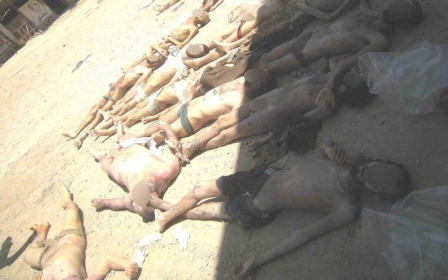Over 5,000 Syrians died under torture by Assad forces: report

A report compiled by Syrian Network for Human Rights said 5,281 people have been tortured to death by forces loyal to President Bashar al-Assad in Syria since the start of an uprising against his autocratic rule in 2011.
The latest report issued Wednesday said the tortured include 94 children and 32 women, who died as a result of being tortured in jail.
It was stated in the report that 243 people were tortured to death in August alone.
Meanwhile, at least 53 people were killed in air and ground operations across Syria on Wednesday by forces loyal to Assad, according to the Network, who also reported army bombardment of field hospitals in opposition-held areas.
The Network, which tracks civilian and opposition casualties, said the Assad government's air and land operations Wednesday killed 16 in Deir ez-Zor, 12 in the suburbs of capital Damascus, seven in Idlib, six in Hama, five in Daraa, three each in Homs and Hasakah, and one in Aleppo.
According to the Syrian General Revolutionary Council, army fighter jets dropped barrel bombs on areas of Aleppo.
Meanwhile, the Syrian government's official news agency, SANA, claimed that Syrian troops "neutralized" a large number of armed groups across Syria.
Syria has been gripped by civil war since March, 2011. A recent UN report said more than 191,000 people are believed to have been killed in the country and more than 200,000 Syrians remain missing.
Last month, the Network reported that more than 133,000 people had been killed in attacks by pro-Assad forces alone.
Middle East Eye propose une couverture et une analyse indépendantes et incomparables du Moyen-Orient, de l’Afrique du Nord et d’autres régions du monde. Pour en savoir plus sur la reprise de ce contenu et les frais qui s’appliquent, veuillez remplir ce formulaire [en anglais]. Pour en savoir plus sur MEE, cliquez ici [en anglais].




